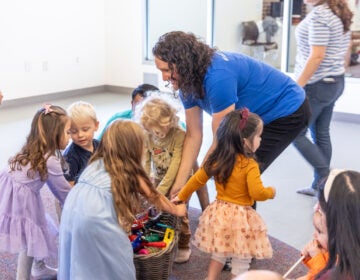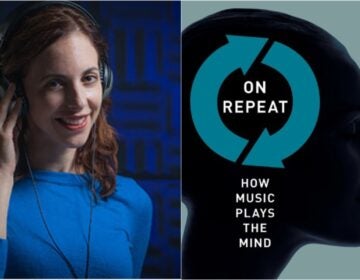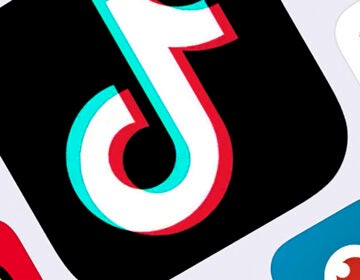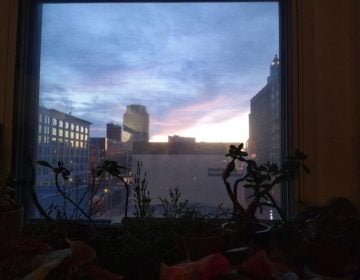For those still out of the loop, here is what ‘6-7’ means
Though the phrase, which comes from a song by Philadelphia rapper Skrilla, may not have one specific meaning, its widespread use in youth culture is unmatched.

File - The intersection of 67th and Callowhill streets in Philadelphia (Google Maps)
From Philly and the Pa. suburbs to South Jersey and Delaware, what would you like WHYY News to cover? Let us know!
If you are around children or are on social media, by now, you’ve probably heard the phrase “6-7” uttered.
The youthful phenomenon, in which kids say “6-7” and move their open-palmed hands up and down for no apparent reason, was recently named word of the year by Dictionary.com. Its origins trace to a song by a Philly rapper with gun-referencing lyrics, but the pop culture use of “6-7” is more playful — even becoming the focus of a recent episode of “South Park,” and companies such as McDonald’s, Pizza Hut and Domino’s have offered promotions inspired by the two numbers.
As the saying has gone global, many people still don’t understand it — or that it’s most likely Philadelphia-based.
So what does “6-7” mean? And why has it become so prevalent? Here’s an explainer.
What does ‘6-7’ mean?
The phrase comes from a song by Philadelphia rapper Skrilla, titled “Doot Doot (6 7),” released last year. Specifically, the lyrics, often repeated in viral videos, go:
“Shooter stay strapped, I don’t need mine,
Bro put belt right to they behind,
The way that switch, I know he dyin’ … 6-7.”
Multiple lyric interpretations exist, according to the user-aggregated music site Genius. After the reference to a “switch,” or gun, some say “6-7” refers to the police code 10-67, widely regarded as meaning a dead body — but a spokesperson for Philadelphia police confirmed to the Bucks County Courier Times that city officers don’t use that code.
It could be a reference to 67th Street or 67th Avenue in Philadelphia, or a street in Chicago, where Skrilla has family. The artist himself says the meaning is fluid — in a recent interview, he said, “That’s just what my brain thought of when I was making the song … It means a block … but that’s not what it means to everybody else now. So it’s just like, turn something negative to something positive.”
As widespread and broad as the saying has become, CNN notes, “6-7 means nothing, but using it can make a student feel like a member of a bigger, cooler group of their peers.”
Who is Skrilla?
Jemille Edwards, 26, grew up in Kensington. In 2013, he and around 50 other children in the Young Chances Foundation program — which offers mission-focused activities to children in Grays Ferry — organized a demonstration in honor of Trayvon Martin. He also played basketball, ran cross country and spoke of wanting to be a fashion designer.
The artist has said that in high school, he spent more than two years under house arrest for heroin-related charges. In his music and in interviews, he has discussed drug use and the history of it in the Kensington neighborhood, as well as other subjects like Santería.
In 2023, he signed to the Los Angeles–based record label Priority Records. He is currently on his first headlining tour, with the last stop being at The Fillmore in Philadelphia on Nov. 30.
Why did the song (and meme) grow so popular?
The song — and its accompanying up-and-down hand motions — became popular through videos on TikTok and other social media, especially related to basketball. Taylen “TK” Kinney, who will soon play for the University of Kansas, is often credited with popularizing the trend, first with a video rating a Starbucks drink as a “6, 7” out of 10 while moving his hands.
Videos made by fans of NBA star LaMelo Ball — who stands at 6 feet and 7 inches — also helped fuel the song’s virality. And a video of a child performing “6-7” while watching a basketball match further popularized the trend.
As the “6-7” lore has grown, and with the fad’s simple, laugh-inducing nature, it’s become more of a silly, fun act to perform than a gesture with any specific meaning. And as with any craze, there’s no telling when its popularity will end, so maybe it’s best to enjoy it while you can.

Saturdays just got more interesting.
WHYY is your source for fact-based, in-depth journalism and information. As a nonprofit organization, we rely on financial support from readers like you. Please give today.







